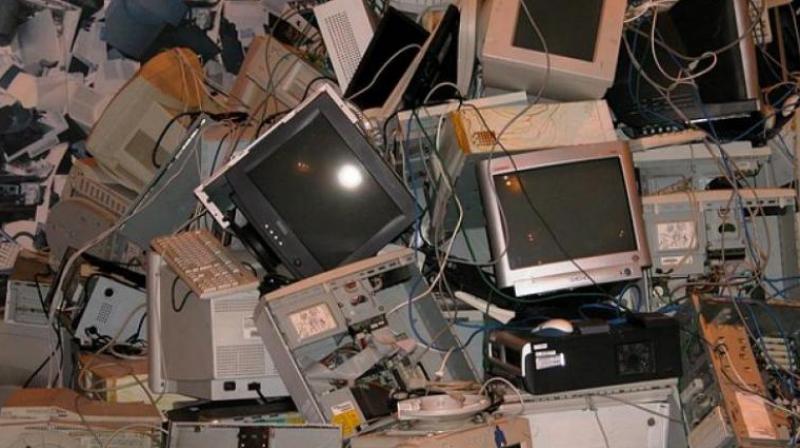E-waste piles up in Hyderabad

Hyderabad: The e-waste collection continues to be haphazard in Hyderabad despite the passage of the e-waste (management) rules this year by the Centre. Collection centres form the backbone of e-waste management, where one can drop off electronic waste — non-functioning printers, computers etc. The e-waste rules that mandate, through the Extended Producers Responsibility, that producers of electronic and electrical goods should set up collection centres, but the rule remains just on paper.
This is in spite of the fact that the producers can now get pan-India permission from the Central Pollution Control Board to set up collection centres; under the 2011 e-waste management rules they had to take permission state-wise. The municipal corporations of other metros have set up collection centres in collaboration with private recyclers. The GHMC has not set up any such centre.
The few collection centres that exist are located either in IT parks or installed at random locations by private organisations. These centres are not very useful if one wants to discard big electrical goods like AC,s fridges or television sets. The state government has also not done its part in registering workers involved in dismantling and recycling of e-waste, or form groups to facilitate setting up of dismantling facilities and provide them industrial training as per the 2016 rules.
The e-waste recyclers based in Hyderabad are reporting an increase in collection of e-waste but almost all of it comes from commercial enterprises. The e-waste from households still goes to the unorganised sector where it is dismantled in a manner harmful to the environment as well as the persons involved. Mr David Motupalli, head of recycling (E-waste, paper and metals), Ramky Group, said the company used to receive 270-400 metric tonnes of e-waste per annum three years ago, which has increased to around 2,800 MT per annum now, of which 30 per cent was from Hyderabad but only a negligible percentage of it is from households.Mr Motupalli said, “We get a minuscule quantity of e-waste from households through our own initiatives, which is not for profit. Only a few producers have set up collection centres in the country as per e-waste management rules; many others are yet to start.”
Even alternatives are not used:
A major hurdle in management of e-waste collection continues to be lack of incentives for electronic and electric waste manufacturers, on whom rests the onus under the e-waste (management) rules, 2016. One can easily discard unwanted electronic or electric goods by selling them to the local scrap dealer and get some money in return. Some companies accept e-waste through their dealers but no money changes hands. In the case of electric goods, one can get a discount on new products.
Users can contact recyclers. Some take it for free, but others may charge you for taking the e-waste. One incentive in the e-waste (management) rules, 2016 is the refund scheme which is not being implemented by manufacturers. The customer can pay extra money as a deposit while buying an electronic or electrical product. When the user wants to discard the product, he can return it to the dealer or the company and get back his deposit plus some amount of interest on the deposit depending upon the period of usage. Another incentive not being implemented is the ‘e-waste exchange’ wherein the producer can offer a set amount of money for taking back the e-waste from the customer.

